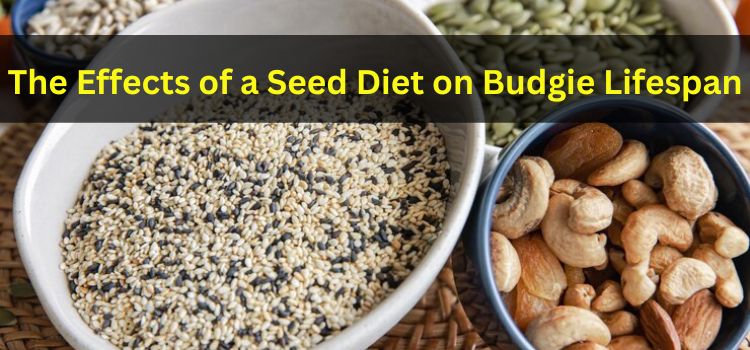Caring for a budgie is both joyful and responsible. These avian companions have unique dietary needs that are essential for their well-being. A question often asked is how long budgies can thrive on a seed diet. Let’s take a closer look at this topic and navigate through the complexities of relying on seeds as the primary diet for these delightful feathered friends.

Understanding the Budgie’s Natural Diet
Before we explore the impact of a seed diet, let’s understand the natural eating habits of budgies. In the wild, these petite parakeets have a diverse diet that includes seeds, fruits, vegetables, and occasional insects. Replicating this natural diet in captivity is crucial for fostering their health and ensuring a long, happy life.
The Allure of Seeds for Budgies
Budgies undeniably have a penchant for seeds. Their small beaks are perfectly designed for cracking open these little treasures, turning seeds into a convenient and enjoyable part of their diet. Yet, depending solely on seeds could result in nutritional deficiencies and health problems, potentially affecting their overall lifespan.
The Pitfalls of an Exclusive Seed Diet
Although seeds are rich in fats and offer energy, they fall short in providing sufficient amounts of essential nutrients such as vitamins, minerals, and amino acids. A diet solely focused on seeds can lead to malnutrition, obesity, and various health complications for budgies. This scenario is comparable to humans trying to survive solely on a limited and imbalanced diet.
The Impact on Longevity
The relationship between diet and lifespan holds significant importance. Budgies exclusively fed a seed diet may encounter a shorter lifespan compared to those enjoying a more diverse and balanced nutrition plan. Malnutrition can compromise their immune systems, rendering them susceptible to diseases and ultimately diminishing their overall life expectancy.
Common Health Issues Arising from Seed-Heavy Diets
Relying heavily on a seed-centric diet can contribute to various health issues in budgies. These may encompass obesity, fatty liver disease, and vitamin deficiencies, particularly in vitamins A and D. Additionally, malnutrition-related problems may arise. These health challenges have the potential to significantly impact both the quality and duration of a budgie’s life.
Transitioning to a Balanced Diet
Understanding the significance of a balanced diet compels many bird enthusiasts to transition their feathered companions to a more varied and nutritious meal plan. The inclusion of fresh fruits, vegetables, pellets, and occasional treats into their diet plays a crucial role in filling nutritional gaps and promoting their overall well-being.
Signs of Nutritional Deficiency in Budgies
Observing budgies for signs of nutritional deficiency is crucial for proactive care. Indications may include changes in feather quality, lethargy, changes in droppings, or abnormalities in beak and nail growth. Detecting these signs early allows for timely intervention and adjustments to their diet.
Tailoring Nutrition to Individual Needs
Budgies, like humans, have individual preferences and nutritional needs. Some budgies may readily accept a diversified diet, while others may resist change. Patience and gradual introduction of new foods are essential in encouraging a budgie to embrace a more varied and nutritionally rich diet.
Seeking Guidance from Avian Veterinarians
For optimal budgie care, consulting avian veterinarians proves invaluable. These professionals can provide tailored advice based on the individual bird’s health, age, and dietary history. Regular check-ups can help monitor their overall well-being and address any emerging health concerns promptly.
Introducing a Balanced Diet to Budgies
Transitioning budgies to a balanced diet requires a strategic approach. Start by gradually introducing small amounts of fresh fruits and vegetables alongside their regular seed diet. Over time, increase the variety and decrease seed proportions to encourage a healthier eating pattern.
The Role of Pellets in Budgie Nutrition
Pellets designed for budgies offer a convenient way to ensure they receive essential nutrients. High-quality pellet formulations provide a balanced mix of vitamins, minerals, and amino acids. Introducing pellets into their diet, alongside fresh foods, contributes to a well-rounded nutritional profile.
Monitoring Hydration Levels
In addition to a balanced diet, ensuring proper hydration is vital for budgies. Providing clean, fresh water daily is crucial. Dehydration can lead to various health issues, and maintaining optimal hydration supports overall health and vitality.
Enhancing Mental Stimulation through Food
Beyond the nutritional aspect, varying a budgie’s diet enhances mental stimulation. Offering a diverse range of foods encourages foraging behavior, keeping them mentally engaged and preventing boredom. Mental stimulation contributes to their overall happiness and well-being.
The Importance of Regular Exercise
While diet plays a significant role, so does physical activity. Budgies thrive on exercise, and providing opportunities for flight, play, and exploration contributes to their physical health. An active lifestyle complements a balanced diet in promoting longevity.
Tailoring Diets for Senior Budgies
As budgies age, their dietary needs may change. Senior budgies may require adjustments to their diet to accommodate factors like decreased activity levels and potential health issues. Regular veterinary check-ups assist in tailoring their nutrition to evolving needs.
Conclusion: Nourishing Budgies for a Full and Healthy Life
In conclusion, the longevity of budgies hinges on their dietary habits. While seeds are a beloved aspect of their diet, exclusive reliance on seeds can compromise their health and shorten their lifespan. A varied and balanced diet, coupled with regular veterinary care, exercise, and mental stimulation, lays the foundation for a full and healthy life for these charming feathered companions.


